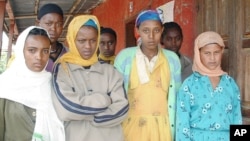An award-winning film written and directed by an Ethiopian tells the story of a young Ethiopian girl caught up in the rural tradition of abducting girls for marriage. The story is true and helped make one of Ethiopia’s oldest and most deeply-rooted traditions, kidnapping young girls for marriage, illegal.
In Amharic, one of the principal languages of Ethiopia, the word “difret” means courage. It became the title of the award-winning Ethiopian film that was inspired by the true story of Aberash Bekele.
Aberash was 14 when she was abducted on her way home from her village school in 1996. Kidnapping of young Ethiopian girls for marriage was common then. However, Aberash fought back. In her struggle to escape, she killed her would-be husband. She was charged with murder and stood trial for two years.
However, with the help of a tough and passionate lawyer, Meaza Ashenafi, Aberash became the first woman in Ethiopia to be acquitted of murder based on self-defense.
A young writer remembers
“I left Ethiopia in 1996 in May,” said Zeresenay Berhane Mehari, the writer and director of the film, “and this particular story happened a couple of months after that.”
Zeresenay described what motivated him to write the movie, "Difret."
“I returned eight years later and had a chance to meet the lawyer who defended Aberash, the young girl,” he said. “I wasn’t aware about her organization, Ethiopian Women’s Lawyers Association. It’s the first of its kind,” a non-profit organization that offers free legal service to women and children.
“And one of the big profile cases that she handled was this abduction case,” he said. When Meaza began talking about the trial of Aberash, “…I knew that I wanted to make a film about it.”
Zeresenay said the story of Aberash is not unique. In his research he discovered that thousands of young girls are abducted for marriage in Ethiopia - as well as in many other countries around the world.
“I actually discovered that many places in Asia, in Africa, in Latin America, some parts of the eastern Balkan areas in Europe, this practice is still alive,” he said.
“In Aberash’s case what was different about it is this girl said ‘no’ to sexual violence. She planned to go to school and her parents did not want to marry her off,” he added.
Not for Hollywood
The filmmaker said it took a long time to bring Aberash’s story to the big screen. He wrote the screenplay in 2008, and began shopping the script to studios in Hollywood, California.
However, Hollywood wanted to film the story in English with famous actors.
“And they wanted to shoot it outside of Ethiopia, which I was not comfortable with,” he said. “I knew I wanted to make this film in Amharic, which is the national language of Ethiopia. And I wanted to cast Ethiopian actors, and I wanted to shoot it in Ethiopia.”
After a long funding search, he finally met producer and writer Mehret Mandefro.
Mehret marketed the drama through an unconventional and clever method.
“She went to people and encouraged them to host fund raisers in their homes, in their businesses,” Zeresenay said.
Angelina Jolie
After the filming was done, Hollywood actress and director Angelina Jolie, whose adopted daughter is from Ethiopia, embraced the story and became the movie’s executive producer. Zeresenay said Jolie’s thinking was that Aberash could have been her daughter.
The trial in the late 1990s mobilized a popular defense of Aberash. Women began to oppose the practice of abduction, “and they confided in a court of law, they confided in the mass media, they confided in the opinion polls.”
Aberash’s murder trial was broadcast on national radio and television in Ethiopia.
"This was something that, for the first time, families in Ethiopia had to sit down and talk about it,” Zeresenay said.
“I think the message is clear,” the filmmaker said. “We have to build a culture of courage. Men and women have to stand up to violence against women, and some harmful traditions like abducting little girls for marriage.”
The young filmmaker is planning for distribution of "Difret" in Europe and Asia. It premiered in New York and Washington last week and is being taken to other U.S. markets, Canada and Latin America.
Zeresenay said because child abductions are prevalent throughout the world, it is his goal that others with similar stories get to have a voice by seeing their story on film.




